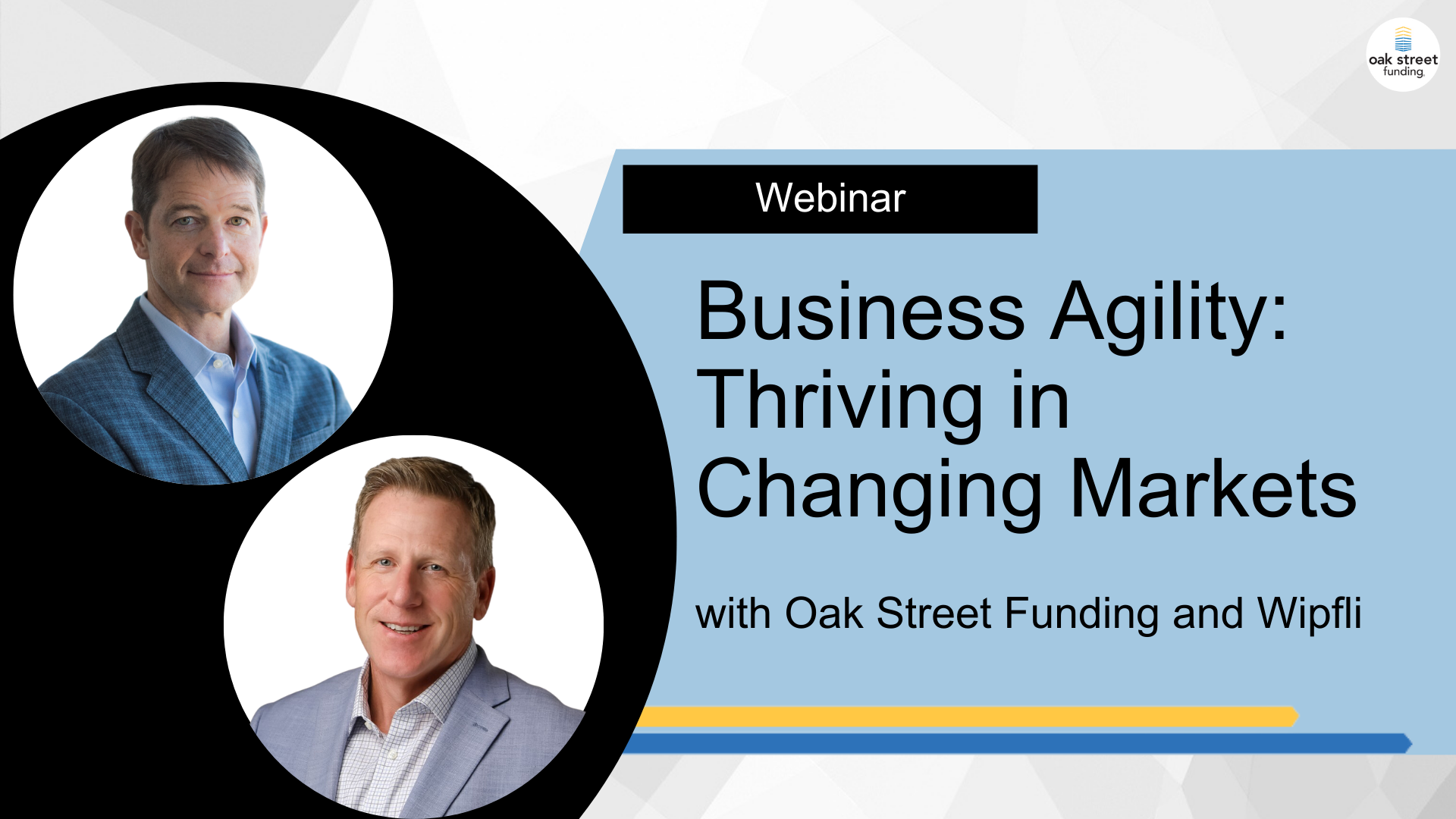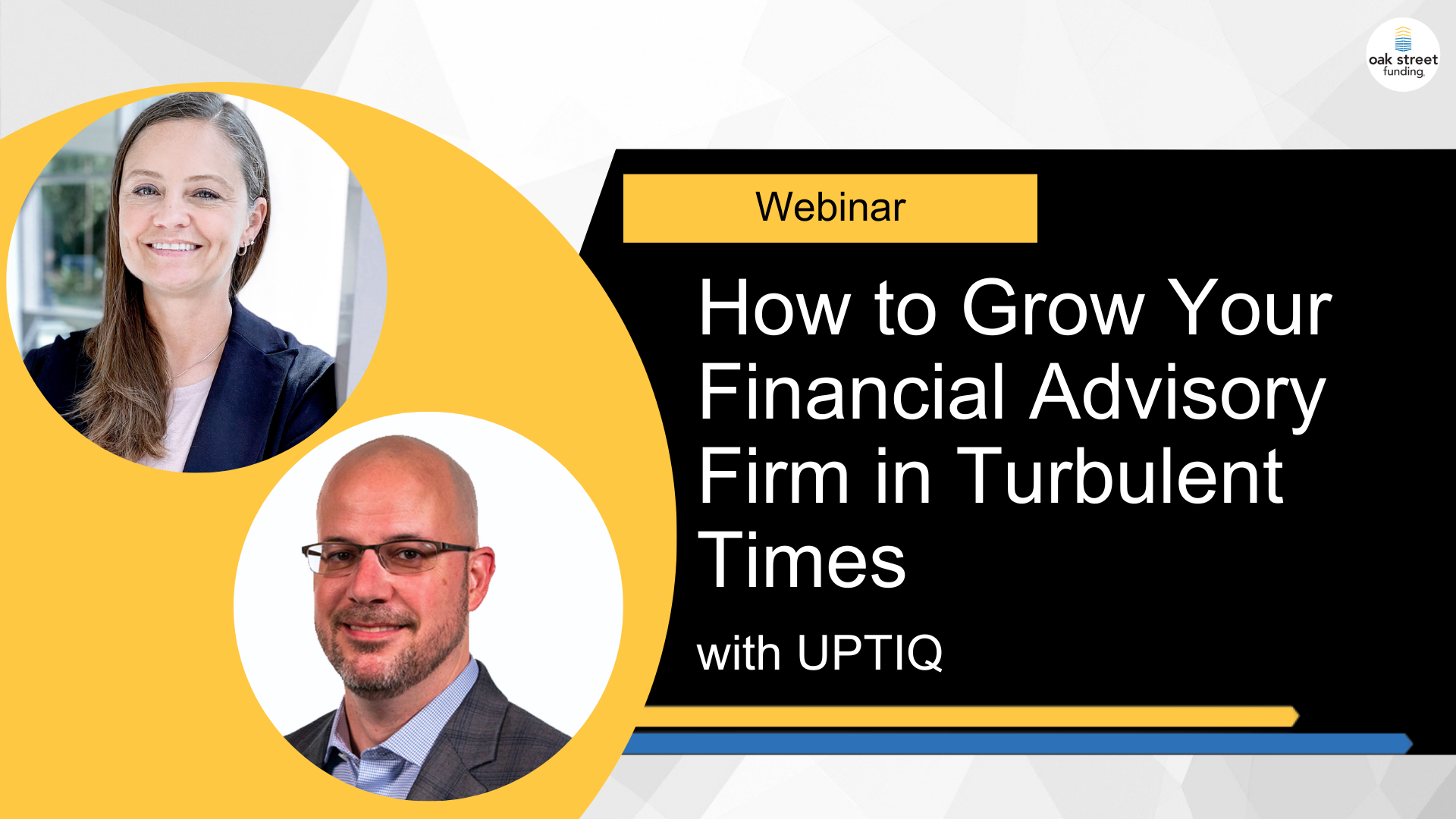Business Agility: Thriving in Changing Markets
- 0.5
- 1
- 1.25
- 1.5
- 1.75
- 2
Bridget Haight: Welcome everyone to the webinar on agility and business. I'm excited to be here today to talk to you about how businesses can adapt and thrive in a changing world. Joining me today are Rick Dennen, founder and CEO of Oak Street Funding, and Paul Lally, principal at Wipfli. Rick and Paul discussed business agility in early 2022, and they are back. So, thanks for being here today and let's jump right in. So, our webinar is titled Business Agility, Thriving in Changing Markets. To align everybody, can you talk to us a little bit about what makes an agile business? Paul, I'll go ahead and start with you.
Paul Lally: Agile businesses are the ability for a business to react to change quickly. And not be in the midst of a rapid change in the business, rapid change in the industry, without a plan to do so. So, when we talk about agile businesses, its ability to plan, but that ability, that plan, meaning agile, it has contingencies built into it. So, as you think of a navigation you use in your car, Google Maps, Apple, it's the ability to look at your destination, but knowing that sometimes it's not always a straight line. So, being able to predict that there's going to be a roadblock or there's construction, in your own business, be able to make that change quickly because you have a plan to do so. We see a lot of times businesses set a strategy, and they're so focused on the strategy... By the way, a lot of times those strategies are very aspirational in nature, and not very tactical in nature. So, it's being able to set a strategy, putting the tactics to it, but then also being able to anticipate a change. Those what ifs a lot of times that no one really wants to talk about. What if there's market volatility? What if there's a change in my own business? What if this happens? To have that plan B in place makes an agile business.
Rick Dennen: No, I think Paul is 100% accurate there, when you talk about that. But culturally, I think you need to have, from the top, that ability for people to make changes on the fly. One thing we always talk about here is, it's better to ask for forgiveness than it is permission. And when you think about setting that culture, you've got to have the data for people to be able to look at, but they have to have the confidence and the know- how to say, hey, I've got to make changes, I've got to make a decision here. You make a decision, it might be a little bit risky, but it's going to give you that culture and the ability to change on the fly. Which, in my opinion, is more and more the type of leadership you're going to need in the future with information at everybody's fingertips.
Bridget Haight: Great.
Paul Lally: And-
Bridget Haight: Okay. So... Did you have something to add, Paul?
Paul Lally: I was just going to piggyback off of what Rick just said. This industry is inundated with data, but the ability to analyze and apply that data, and then read that data the right way, having the right KPIs in the business, know exactly what you're looking at, and in that data have the plan to react to it.
Rick Dennen: Yep.
Bridget Haight: Great. So, business owners are going through a lot right now, there's rapid technology change, there's economic uncertainty, changing workforces, and more. So, Rick, what would you say is the most pressing issue for business owners right now? And then Paul, I'd love to hear what you have to say after that.
Rick Dennen: The Fed announced that they were going to hold rates steady again, and they'll reevaluate in December. When you think about the future of that, we had an unprecedented time where the slope of the rate increase was the steepest it's ever been in the history. So, how did that respond in the market, or how is that received? We had a real slowdown in M& A activity for the first half of the year. But you've got this pent- up capital, and there's a lot of it that exists, and I think that's starting to come back. But this morning I woke up and started reading some of the reports, one of them saying, there's going to be one more rate increase. The other one's saying there's going to be none. The timing of when rate decreases occur can all impact decision making of leaders, and I think... Kind of goes back to the first question we talked about, being fluid, those things are going to change. You can read a different report from a different source every single day, but having that information, being able to respond through it, having contingency plans in place, I think is the way leaders are going to need to lead in the future.
Bridget Haight: Paul, do you have anything to add?
Paul Lally: I do. To piggyback off of Rick, just take a step back. The pressures on these owners is mounting. And then, Rick made a statement, and I would just put it in one big bucket, for a lot of these firms right now, it's an unknown future that's really concerning them. You read this, it's saying rates are going to stay, rates are going to go back up. They don't have the information at their fingertips accurately and confidently to make decisions on the business right now. And they're also faced with, market volatility in this industry means revenue volatility because a lot of these firms are intrinsically connected to the performance of the market. So, you have revenue volatility, but you also have an expense structure, a lot of their expense structures are fixed. So, now you're seeing a lot of profit pressure on that as well.
Rick Dennen: Great points.
Bridget Haight: Wait, say that one more time. There's a lot of what?
Paul Lally: Profit pressure.
Bridget Haight: Okay.
Paul Lally: Margin pressure on these firms. The key right now for most businesses is how do I remain viable, stable, and sustainable? That's the key. I think we saw over the past couple of years, because of the activity in M& A market, because of the multiples that were being paid... I don't know if it was being directly said by a lot of firms, but there was a mentality of preparing my business to sell. And I think now that mentality is, I prepare my business to keep. And how do I keep this business now? And it's really that short term tactical planning. I have two daughters, I look at my daughters and they're the most beautiful daughters in the world, but it's like, looking at your business, sometimes you have to step back and say, okay, let me really objectively look at my business. Is it as viable, stable, and sustainable as I need it to be right now?
Rick Dennen: Yeah, really good point there. I think back to my childhood, you bring up your daughters, and childhood of where it's like, okay, my dad used to say, what are your goals? And he'd break them down by half year, by quarter, by month, and say, how are you going to achieve them? Business is no different. You may have a three- year, five- year plan, but it's got to come down to tactical when you're operating that business day- to- day. But then, like we've talked, it's got to also change day to day based on what you're seeing in the markets.
Bridget Haight: Right. You've got to be ready to pivot whenever you can. Rick, so how can businesses manage their finances effectively in the midst of the economy, while balancing risk? Do you have any advice on that?
Rick Dennen: Risk return. When you think about lending, it's risk return. It's you put out money, what's the risk of that deal? Are you getting compensated for it? Is there alignment between the borrower and the bank, and whatever they're using the money for? So, just I think a real simple answer is, yeah, you've got to balance risk in return, but also having reserves I think is prudent, as we talked.
Bridget Haight: Okay. Paul, what do you think?
Paul Lally: I agree with everything Rick just said. And particularly around the reserves. Oftentimes we see, over the years, we've seen businesses inaudible the market is they're running the business without very little in reserve for that just in case I need this money. And a lot of times what we've seen, yes, the multiples were high in M&A, but what has driven businesses to sell oftentimes is they don't have the capital to affect their business going forward. Because they pulled it all out over years, versus creating that war chest for themselves. So, that's one. Second, it's focusing on the expense structure. As business, as the markets were so powerful over the past several years, you saw a lot of inflated expense structure. So, now it's really looking at that expense structure and say, okay, what is fixed? What is variable? What do I need to do in- house, and what can I outsource right now on my expense structure? Because as Rick said, it's about having those reserves and having that comfortable, confident profit margin in your business.
Bridget Haight: Okay.
Rick Dennen: Yep.
Bridget Haight: Great. So Rick, how is Oak Street funding managing risk? Is credit and lending changing?
Rick Dennen: At the bank, real quick on the strategy of the bank, we're trying to organize, the bank is looking at core banking. So, consumer, traditional CNI, wealth and treasury, that's your core bank. On the specialty side, at First Financial Bank is you've got Oak Street, you've got franchise lending, you've got foreign exchange, you've got your real estate group, you've got an equipment finance group, business capital, ESOP lending... We've got all these specialty lines. So, how is it changing when you think about it? Well, we've got all these different levers, that we can turn on and turn off at different times in the economy. And that strategy was put in place with Claude Davis, back in 2015, when they purchased Oak Street. It was, hey, we want to have a bunch of different levers that we can pull at different economic cycles. So, right now, when you think about real estate lending, just like we talked about with M& A, lending to office parks. Paul touched on the different remote working, well, offices that needs to settle down for the next couple of years to figure out what is the demand and what is the supply of office space in the future. So, right now, there's a pause on office. Warehouses have been way overbuilt in the last couple of years, so how is that going to settle in? But during that time, when you talk about RIA lending, that's still a really good market. Insurance lending, and some of the other verticals that we're in, our foreign exchange business is doing really well, which really thrives in volatile situations. So, that's another business and another level we can pull. So, when you talk about at Oak Street, it's like, right now we're trying to just manage our lending, and our structures that we put out there are being very consistent with what we've done. If somebody wants to pay, instead of paying an eight times multiple for a business, if they want to pay 15, that's fine. We're still going to lend the same amount of money on a senior structured facility, they got to figure out how to come up with that, if that's they so choose on how they want to pay for it. But in the real estate side, yeah, let's slow it down, let's figure it out, let's see how the markets settle and go from there. But it's wonderful that we have those channels to pull these different levels at different points in times to be able to continue to grow and evolve.
Bridget Haight: Great. Paul, what do you think businesses can do to adapt to all the changes?
Paul Lally: First and foremost is understand the business, understand your business. I use what I call the dance floor analogy, a lot of times owners of private businesses in general, they spend so much time daily on the dance floor, working in their business. And they struggle to get, I say, get onto the balcony and look down at the business, to work on the business. So, it's the ability to extract yourself out of the day- to- day to work on the business for change. And then understand what change means. A lot of business owners, I believe, over the years have confused growth with performance. They are two completely different things. Growth is driving the revenue, driving the business to be bigger. The performance is the ability to support that from the business standpoint. So, you look at inaudible change, well, you'll look at change around what we call this velocity wheel. It's leadership, it's the vision of the business, it's the brand of the business, it's the operations of the business, it's the technology of the business, it's the finances of the business, it's the people in the business. And being able to, again, going back to how you look at these changes, no one likes change, especially they don't like change when change is forced upon them. So, you have to start embracing the change. Embracing the change and planning for that change... It depends on where you're changing, but I think this industry, I think the wealth management industry, it's going to look a lot different in five years than it does today. Because you're starting to see the emergence of no longer" wealth managers," you're seeing wealth management businesses, and large ones emerging. So, it all goes back to that short term tactical, what if planning, around my key components of my business.
Rick Dennen: And Paul, when you refer to wealth management businesses, are you referring to diversity in services that is going to be offered in the future?
Paul Lally: Well, you're seeing diversity of services now, Rick, you're seeing-
Rick Dennen: Yeah. But is that what you're saying is going to evolve and really change in the next five years?
Paul Lally: Well, I think there's a couple things are going to change. Off top of my head, I'm going to say there's three. One is the diversity of offerings. You're seeing now wealth management firms buying tax practices, they're getting into more the multifamily office trust, they're trying to do trust work, they're adding insurance to this. So, it's the diversity of the service. The second is, again, going back to the change in consumer behavior. It used to be, hey, let's meet with our clients on a quarterly basis, probably saw our larger clients on a quarterly basis... But how are you connecting with them? A firm said to me recently, " Well, my clients are older in age, and they are not technologically savvy." And I stopped them and said, " Well, wait a second, my mother's 75 years old and comments on my LinkedIn posts." So, they are technologically connected. So, technology is another area. And then workforce management, talent and culture, attracting and retaining and understanding the work behavior of this next generation coming up.
Rick Dennen: Yeah.
Bridget Haight: That leads us beautifully into the next question. So, to be able to adapt in the ways that you guys mentioned, it really needs to come from the top down. So, what are the most important skills and qualities of leaders today, and how does that differ with some more traditional leadership skills from previous decades? Paul, I'll start with you.
Paul Lally: I think the traditional leadership skills, that I grew up with, so I can actually personalize this, is I had a boss and that boss managed me. I think today you have to be a leader. You have to have, not only a compelling vision that you understand, but be able to transfer that compelling vision throughout your firm, throughout your business, that people rally around it, embrace it. Because this generation now wants to know where the business they're involved in is going, but more importantly, how they're part of it. How do they succeed as the business succeeds? So, I think it's a few things from leadership. A deeper level of transparency... Now, you don't want to be overly transparent, but a deeper level of transparency from a culture standpoint. Communication is key. And also understanding that we can learn from this younger generation coming up.
Rick Dennen: Echoing what Paul said, leadership is key, the concern that I have for the future is that the kids coming out of school are so intelligent these days, but I would tell you, I think they want the responsibility, but some of them want to sit at home and work five days a week at home, and I just think back to my experience, which started in public accounting, and the amount that I learned of going to a different business every two weeks, three weeks, working in a team environment every two or three weeks, those experiences of learning were so valuable to define my leadership skills, and how I wanted to start the company and provide leadership, oversight, culture, all those types of things came from having these different experiences. So, that's what I think, Paul, that's got to be figured out. But leadership to me is something that actually develops over time. It's like your athleticism and things like that, certain of that stuff is innate, when you're born, just like there's certain things on the type of people you are. But being intentional about developing your entire company to be leaders, I think will then empower you to empower the business to grow exponentially.
Paul Lally: Rick said something really important, is the experience of being in the office.
Bridget Haight: Yes.
Paul Lally: And that experience from inaudible. One is, the building a camaraderie.
Bridget Haight: inaudible.
Paul Lally: When you're working with a team every day, or you're in the office, you're building a camaraderie. You're going out after work, and sometimes you're going after work to complain about your bosses. But you're building a bond and a camaraderie around that. And also, Rick, you point to, you miss the oh by the ways when you're not in the office. When someone's walking past your office and say, hey Rick, oh by the way, can I see you for a minute? And there's a good conversation there. We need to get back to that somehow.
Bridget Haight: Yeah.
Rick Dennen: But, I know Paul feels the same way, I'm sure he does. But that culture of that Monday to Friday, even at Deloitte, it was Monday to Saturday, required being in... That doesn't exist anymore. So you've got to embrace what's happening, but you also want to embrace the values that we just talked about, about being together. There's no doubt in my mind, being together is better for us and development of our people, as well as for our customer, but being together seven days a week isn't the future either.
Bridget Haight: All right, let's see. So, being an agile leader and creating a modern culture is great, but a business also must thrive through its employees. So, how can businesses attract top talent and bring in those that'll fit and grow their culture? Rick, we've already started talking about this, but do you have anything else to add about that?
Rick Dennen: Staying close to them, but it's like we said, you've got to be... You've got to understand what their needs are, what they're looking for, to be able to respond. In my opinion, it's not about cash every single day, that's going to drive decisions. That's important to everybody, I think, but it's not the only thing. When you think about, quality of life is more important to the younger generation than having an extra dollar. So, understanding that, building the culture that empowers them to make decisions, gives them opportunities to grow and learn is really important. But with that as well, they've got to understand, hey, I need to be in the office. The best way for me to progress and learn and develop is maybe three days in the office a week, or being pulled into certain meetings. So, having that willingness, but having the balance, understanding what those would be. But those things are evolving and changing.
Bridget Haight: Yeah.
Rick Dennen: Goes back to question number one, on being fluid in your business and making decisions. So, it's not easy.
Paul Lally: Attracting and retaining talent now... One is from the leadership standpoint, being able to properly and effectively convey your own story about your business, your vision, and your vision where someone, again, you want people to rally around this vision, it has purpose, it has core values, and be able to properly express that. Also, the generation now coming into our businesses no longer want to be managed by dictatorship. They want to understand their purpose in the business. What's my purpose? What's my career path in this business? And there's tools out there too, and I would hope more business owners would use these. There's tremendous systems for behavioral testing. We use Predictive Index here at Wipfli. And it's being able to... It's not going to be a selection tool at times, but you can really see how that person will fit into your culture, how that person could fit into a team. But most importantly, Bridgett, understanding your own culture. We've talked to firms over the years and businesses, and we interview the leadership team, and they define their culture this way, and then we interview their staff, and the staff has a completely different view of the culture. So, really, really understanding what your culture is at the business.
Bridget Haight: Right. You did it again, you're leading me right into the next question. So, you're going to be repeating-
Paul Lally: That's why I'm here, that's why I'm here.
Bridget Haight: So, it says one of the great aspects of building a strong culture and internal team is that it greatly benefits from your external relationships with customers and vendors and partners. Are there additional things that leaders can do to help their teams build and maintain strong customer relationships?
Paul Lally: Train them how to do it. Take them... And I said that very quickly. We see this at our firm. You're bringing staff in and assigning them a task, or assigning them a role, or a job, but they're not really experiencing going to meet a client. And so, bring them along, have them sit with you. Now, they may spend a lot of time not saying anything in those meetings, but they're learning how to be in a meeting, they're learning how to manage personalities, they're learning how to manage a conversation. It's all those non- technical softer skills that they're learning. I could be the smartest person in my area, but if I can't effectively communicate a whole conversation with someone, I go from being effective to very ineffective quickly. So, I think inaudible bring them with you, bring them up the way we were taught in the business, have them tag along, have them listen to conversations. That's how you learn the business.
Bridget Haight: I think you said it so quickly because it's the obvious answer. To me, it's very obvious. Yeah, you train them. Rick, do you have anything to add?
Rick Dennen: Anytime I've been with Paul, he always is the smartest guy in the room, so I always learn from Paul, as I've been in meetings with him. At Oak Street, we've always said our employees are the most important thing. We don't say customers are. And the reason we say that is because if you can have employees that are engaged, they're smart, they're decision makers, the services that we're providing to our customers are going to be enhanced. And if we can attract and retain that top talent, customers are going to be happier. And that has played out over 20 years of being here.
Bridget Haight: So, let's take a step back because building a culture is one thing, but if it doesn't impact performance or engagement, it's not productive. So, how can businesses measure and improve their performances continuously, while tracking ROI? Paul, I'll start with you if you don't mind.
Paul Lally: There's two ways to develop and manage. Or lead, I believe. There's the subjective way of doing it. You're doing a good job, keep it up, slap on the... But then there's the objective. And putting metrics to this performance is part of your culture. How do I objectively measure performance? And hold accountability to that as well? Because I'll tell you too, our staff, they want to know their objective measures. Subjective is great, everybody loves a slap, again, a slap on the back, or the big hoorah.
Bridget Haight: Hey.
Paul Lally: But at the end of the day... I say, you work for three reasons. You work to practice your trade, you work to have fun, and you work to make money. And having fun doesn't mean you're goofing around. But this generation wants... The staff, people, everybody in general, wants to know how am I going to practice my skill and be measured? What's the environment you're putting me in, so I can enjoy what I'm doing? And how do I make money?
Bridget Haight: Okay.
Rick Dennen: So, at the bank and at Oak Street here, we do Gallup surveys, that everybody's aware of. But we do these Gallup surveys every year, and while I'm not... You can't read those things as if it's set in stone and everything's 100% accurate, and you got to react to everything, but it gives you a couple of ahas, and it also gives you a baseline to see maybe where you're trending.
Bridget Haight: Okay.
Rick Dennen: But the aha to me was, we've got a woman that manages a call center here, which is probably one of the toughest jobs at the bank, at Oak Street, anywhere else. And she got the highest ratings in the entire bank, in the entire company.
Bridget Haight: Wow.
Rick Dennen: And it's because she provides that feedback every day. It's not just the great job, this, that, and the other, it's very constructive criticism or feedback to say you could do this better. And every one of those employees wants to do better for her, and to be better for the company.
Paul Lally: And just to add a point. So you mentioned Gallup, so we do associate engagement surveys, and we have roughly 3, 500 employees, so it's a big survey. Rick, it's interesting, we see a direct correlation between our associate engagement surveys and our client satisfaction surveys. They're intrinsically connected. They move. If our associate engagement score is down, I would guarantee you our client experience engagement score is lower. inaudible our employees pulls up, because they're just more engaged with our client.
Rick Dennen: Yeah. So, we do the Gallup internally, and then we do net promoter score externally.
Paul Lally: Correct. That's what we do.
Rick Dennen: 100% correlated. One affects the other, which is why we can best control the employees, which is where we focus on how we can better them.
Bridget Haight: Right. Makes sense. Well, we've reached the part of the webinar where I say, are there any last words of advice for business leaders as we head into 2024? So, top three tips as we go into the next year. What do you think, Paul?
Paul Lally: Change is inevitable, so embrace change. Plan for the change, plan for the what ifs. Again, I think we said earlier, it's this unknown future everybody's wrestling with. And get off your dance floor, get onto the balcony, and work on the business. Secondly is, again, that ability to create the culture, to attract and retain talent. There's a war on talent, people are losing talent as quickly as they're gaining talent. So, I agree with Rick, your employees are the most important asset of your business. So what are you doing for them? And then the third tip is technology. Step back, really, really look at your technology. Is it, do you have the right technology? Is it integrated? Are you optimizing it?
Bridget Haight: Great advice. Thanks Paul. How about you, Rick?
Rick Dennen: Like I said, Paul is always the smartest guy in the room-
Bridget Haight: Listen to Paul, listen to Paul.
Paul Lally: Rick sent me his notes, I'm just reading Rick's.
Rick Dennen: My comments are stay close to your employees and customers. The cost of acquisition of both has gone up tremendously, and if you stay close to the employees, we've talked about it, you're going to understand them better. You stay close to your customers, you're going to service them better. And I think there's your win- win summary there.
Bridget Haight: Great. Thank you. So, thank you both for your insights today. In today's rapidly changing world, it is more important than ever for businesses to be agile and adaptable. And I'm sure those listening learned a lot as well. So, we'll be sending out a recording, along with Rick and Paul's contact information in case you want to continue the conversation. Thank you and stay tuned for our end of year webinar coming soon as well.
DESCRIPTION
Companies are facing an unprecedented rate of change, driven by factors such as digital transformation, regulatory shifts, and the changing needs of customers and employees. To thrive in this environment, you need to be able to adapt quickly and effectively. This means having a workforce that is skilled, agile, and adaptable.
In this webinar, Rick Dennen, Founder and CEO of Oak Street Funding, and Paul Lally, Principal at Wipfli, will discuss how you can navigate changing markets to grow and strategize by leveraging technology to improve your talent management, employee retention and recruitment, and operating agility.







